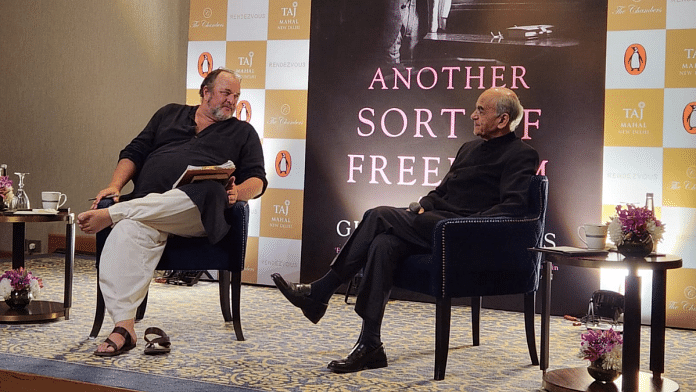New Delhi: If you were born in Lahore, saw Sikh-Muslim Partition killing at age five, studied Sanskrit at Harvard, worked for MNCs during the License Raj, championed economic reforms, wrote books on Dharma and desire and got called both pro-Modi and anti-Modi in one lifetime — what’s left to do?
Write a memoir, of course.
Because you have lived the India Story. And you are Gurcharan Das.
Another Sort of Freedom is Das’ fourth book.
“I wrote the books because I had a problem,” he told historian William Dalrymple at the launch event organised by Penguin India and Taj Mahal Hotel in New Delhi. Each book arose out of a problem, but each book offered a kind of freedom. The new memoir, he said, was about moksha, a freedom that comes in the autumn of a life lived well.
And he lived through some interesting and transformative times. Born at a time when “Hitler, Churchill, and Hirohito were bashing everyone around”, he grew up in Lahore and then migrated to India during Partition. He went to school in the United States during segregation and returned to champion capitalism in a socialist India. In many ways, he was an Indian Forrest Gump — witnessing and living through quantum leap moments of history.
But the act of writing a memoir, Das said, is one of playing God and selecting. It is different from writing an autobiography, which tends to be an information dump.
“When you write a memoir, you can choose. The temptation is to make yourself look good,” he said. “If you look too good, people will call you a pompous ass. If you look too bad, people will call you a bloody loser. They will ask, ‘Why should I bother reading this book’?”
His four books deal with the four vargas of life. India Unbound was about artha (economy); The Difficulty of Being Good was about dharma (morality); Riddles of Desire about kama (desire and pleasure), and now, the memoir is about moksha (unbridled freedom).
Das’ eclectic interests make it hard to put him in a box.
But one unambiguous thing Das has been is an ‘extreme marketwalah‘, he said. His liberal libertarian ideology made him unfit for both Congress’ Sonia Gandhi and Bharatiya Janata Party’s (BJP) LK Advani when he sought ticket to contest election.
Also read: 26/11, Sri Lanka insurgency, Gulf War—this Oberoi hotelier recounts his adventures in memoir
The moment Das converted
The freewheeling conversation between Das and Dalrymple moved from Partition to Manmohan Singh to Mahabharata to Margaret Thatcher to AI seamlessly. But his most caustic comments were reserved for Indira Gandhi’s socialism and for having sacrificed the opportunities of two generations of Indians.
His tryst with all that was wrong with India came when he was selling Vicks Vaporub for Procter Gamble India. It was during the Licence Raj era. India was going through the flu season, and his company had manufactured and sold more Vicks Vaporub than the government licence allowed them to. There was a show cause notice from the government. Das had to present himself at the Monopolies and Restrictive Trade Practices Commission (MRTPC) joint secretary’s office. He was subjected to a volley of hostile questions.
“He made me feel like a criminal,” Das recalled.
The so-called crime carried a three-year jail term. He reminded the joint secretary that it would look really bad for India if The New York Times reported that he was sent to jail for producing and selling an ointment that gave comfort to people during the flu. That worked. He was let off with a warning.
That day, Das got converted. He joined the Swatantra Party, founded by C Rajagopalachari. To this day, it is the only political party that unapologetically championed free market economics.
Also read: A memoir about 3 Peshawar sisters traces Partition history with new lens. No blood…
What’s happening in Vietnam?
The real freedom came in 1991 when the Indian economy opened up.
And yet, many years later, Das said he was driving to a global Pampers meeting in the US, and he heard on NPR that India’s economic reforms were in trouble from the Left parties.
“Margaret Thatcher said that she reforms during 20 per cent of her time and spends the rest of the 80 per cent of the time defending reforms,” Das said. “In India, nobody was defending the economic reforms. Not even the Congress party.”
India reformed in stealth, and got trapped in a “false tradeoff between growth and equity”, he said.
And now, as global companies begin to exit China, Das said India is still not set to benefit. The investment is going to Vietnam instead.
“If I was working in the commerce ministry today, I would send my team to Vietnam to understand what’s going on there,” he said.
A lonely liberal libertarian
At his core, Das calls himself a lonely liberal. Nobody has any use for a liberal libertarian today because they reject both the identity politics of authoritarianism and the redistributive socialist politics. Liberalism is a lonely road, he said.
At a recent lecture in the city titled ‘The Dilemma of an Indian Liberal’, Das said he is a man with “no one to vote for”.
But he blamed liberals for where India is today with the rise of Hindu nationalism.
“The liberals regarded religion as a superstition and not as a way of life. In the process, Indian liberals ended up losing the language that millions of Indians speak,” he said.
(Edited by Humra Laeeq)



